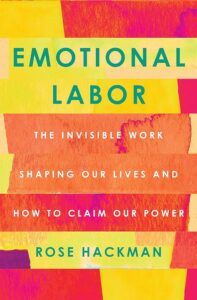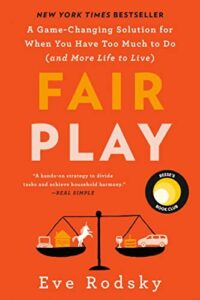How to Stop Fighting About Fairness and Create More of it in Your Relationship

By Darren Wilk
R.C.C., M.A., C.G.T.
If you have children living at home you probably are feeling like you are pulled in so many directions that leave you feeling exhausted, stressed and unappreciated for all that you do. You are not alone. My partner and I have raised five children together and we are both Certified Gottman Method Couples Therapists at Best Marriages. We hear from most of our clients that they feel they are not playing on an even playing field. I get it, because most of our personal conflicts, back in the day, were about the unfairness of it all, and both of us feeling overworked, overwhelmed and under-appreciated. We eventually figured out how to change the game and come to agreements on how to deal with all of the invisible work that is often called the ‘Emotional Labour’ or ‘Mental Load’. The tools from our Gottman training helped us discuss this problem and get to the bottom of it.
Three Key Ideas Came Up That Helped…
You first have to agree that both of you are important and valuable to running the home. No one should feel resentful and that this is unfair. No one should feel like their work is more important than the others, just because there is a larger pay check attached to it. According to author Rose Hackman in her book Emotional Labor: The Invisible Work Shaping Our Lives and How to Claim Our Power
“A contribution to the home should be measured by more than just money. It also helps when you BOTH have trust in the agreement to make your partner’s life the best it can be. When there is a feeling that someone is not doing their part, resentment starts to build and the joy of the friendship starts to disappear.”
Essentially, every relationship’s trust is built on this idea that I can count on you, you have my back, and I matter. So, if any kind of resentment is showing up, you need to ask yourself if you are needing to revisit the compromises and agreements that you have made.
Second, a conversation should happen with the goal of both partners feeling like their work is valued and there needs to be a shared understanding of the unseen work. There is an immense amount of unseen work. There is nothing that makes a partner more upset than being questioned about work that is assumed is theirs, even though it was never agreed upon. We hear more of these complaints coming from the parent who is mostly responsible for the child care and the home.
Questions like:
- “Do our kids need to eat supper before the game?”
- “Where are the clothes for the soccer game, I thought you laid them out?“
- “Where do we keep the diaper cream?”
- “When is the birthday party for Jaden, and did you pick up a gift?”
- “When are the school interviews and who is their teacher this year?”
Or comments like:
- “Just make me a list and I will do it”
- “How was I supposed to know we are out of milk, I just picked up the stuff on the list”.
I am sure there are hundreds more examples of ‘Mental Load’ which is carried by one person or the other.
When these complaints come up in a fight, the typical excuse used is about how much work it takes to keep a roof over our heads and make enough to pay for all of the extras we enjoy, like trips, cars and activities. Once again the financial contribution trumps the emotional labor of running the home. There is a sense of this being devalued, because there is no tangible evidence of accomplished work, besides the kids still being alive. This comparison insists that we are comparing apples to oranges. There is no level playing ground, we have to take the finances out of the equation, because this is an inadequate and unfair comparison that only prioritizes income. This argument usually ends up in a gridlock, which is crazy making and what the Gottman’s call a “gridlocked perpetual issue”.
The third idea is to create a conversation called the “Dreams Within The Conflict ”, which gets at the hidden agendas and deeper symbolic meanings under each person’s position. We use this intervention everyday with our couples at Best Marriages. Both people need to have their say and feel understood without trying to solve this. This means listening to each other and asking questions designed to understand the situation, before coming up with a quick solution that often ends in resentment.
If you want to learn more about this type of conversation you could read the latest book by Dr. John and Julie Gottman, called Fight Right, How Successful Couples Turn Conflict Into Connection.

If you’re not into reading books, we can certainly help you have the conversation. The goal of these conversations is to grow closer and create more intimacy.
When we avoid conflict, we avoid closeness.
The most growth that happens in a couple’s life is when they successfully work through some of their biggest dilemmas.
Of all the conflicts couples have, fairness is definitely in the top five. Even couples that don’t have kids struggle with this. Those fights are usually about who initiates activities, time at work or with friends vs time together, and dealing with meals, just
to mention a few.
Get The Book: Fair Play 
Alternatively, I have just finished an excellent book that comes with a card game, called Fair Play: A Game-Changing Solution for When You Have Too Much to Do, and More Life to Live, by Eve Rodsky.
My partner and I just finished playing the game. Just by not having children at home, it was surprising how many cards we got to take out of the deck of a 100 items that happen in a typical home. Our deck started with 60 cards. Right away we both felt grateful for all of that extra time, and at the same time amazed at how we survived 5 children.
One of our friends who was also playing it, told us that on her first go around she was carrying 92 cards and her partner had 8. She laughed, but also it was not funny. After about 2 hours we divided up all of the workload into a fair system that both of us agreed to. It was a lot of fun and I ended up with a few more tasks, like hosting parties, and weekend plans and took a few off my plate that we were unclear who was responsible for. None of these decisions are set in stone and someone can renegotiate the card they hold at any time.
Please take time to get this area right in your life so that it frees up time to follow your personal dreams and self-care activities or down time. YOU and YOUR RELATIONSHIP are WORTH IT!
Ps> these are the cards I am working on in the deck.



